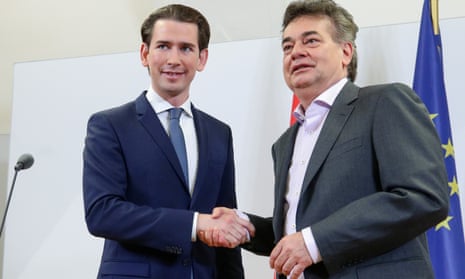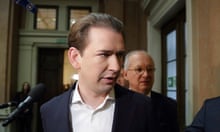Austria’s Conservative and Green parties have agreed plans to extend a headscarf ban in schools and introduce “precautionary detention” of dangerous asylum seekers under a coalition government deal that also intends to make the Alpine state a leader in tackling the climate emergency.
Sebastian Kurz, the leader of the Austrian People’s party (ÖVP), is set to return to the chancellorship, after hammering out a deal with Werner Kogler of the Greens, which would bring the smaller party into the national government for the first time.
Unveiling the agreement on Thursday, Kurz said it was “the best of both worlds” and allowed the two parties to keep their election promises.
Under the plans, Austria will aim to become carbon neutral by 2040, a decade earlier than an EU-wide target. Kurz said Austria would be a forerunner in protecting the climate, with a pledge for all electricity to come from renewable sources by 2030, as well as more spending on public transport. Kogler, nominated as vice chancellor, said the agreement would make flying slightly more expensive and taking the train cheaper.
The two leaders reached agreement over the weekend after weeks of negotiations following September’s elections. Both parties made gains in the national vote, called after the breakup of Kurz’s coalition with the far-right Freedom party over a corruption scandal.
Kurz’s party will have 10 ministers in the new government, including those responsible for foreign policy, defence, finance and home affairs. The Green party will hold four portfolios: environment, justice, social affairs, sports and culture.
Ahead of the official announcement on Thursday afternoon, Austrian media concluded that Kurz had succeeded in pushing forward his tough stance on illegal immigration and “political Islam” in the 300-page coalition deal.
“A lot of turquoise and a little green,” was the headline in the tabloid Kronen Zeitung, referring to the political colours of the two parties, concluding that Kurz’s agenda had prevailed, while a big reform of green taxes would have to wait.
The paper reported that the coalition deal includes banning the headscarf in schools for girls up to age 14, an extension of the garment ban that applies until age 10 approved by lawmakers earlier this year.
The agreement also revives a plan for “precautionary detention” of potentially dangerous asylum seekers even if those individuals have not committed a crime. Earlier this year the Kurz government proposed detaining asylum seekers deemed to pose a risk to the public without a court order, a plan that would require a constitutional amendment.
The government also plans new return centres for asylum seekers whose claims have been rejected.
The two parties have also agreed to set up a working group on a greener tax system. According to Die Presse newspaper, CO2 will be taxed more heavily, but there will be no explicit carbon tax. Higher taxes are also expected on the most polluting heavy goods vehicles, an issue that is also a priority for the country at EU level.
Other Green policies contained in the coalition deal include plans for a freedom of information law and greater oversight of party finances.
Kurz also announced that corporation tax will be cut to 21% from 25%. Income taxes will also be reduced for those for those in the current 25%, 35% and 42% brackets, with corresponding rates cut to 20%, 30% and 40%.
If the Greens’ federal council approves the coalition agreement, the government is expected to take office on 7 January. Observers do not expect this body of local and national lawmakers to block their party’s path to power, but Kurz’s hardline stance on immigration and identity will be difficult to swallow.
Sigrid Maurer, a Green politician who was involved in coalition negotiations, told the Ö1 Morgenjournal radio programme that she was confident the federal council would approve the outcome on Saturday, although she conceded some parts of the programme would “be painful” for grassroots members. She added that other parts were “also painful” for the ÖVP.
Both parties will seek to push through their agenda through control of key ministries.
Kurz’s confidante, Susanne Raab, who worked on the country’s 2017 ban on full-face veils and a 2015 law designed to curb “political Islam”, is expected to run a new ministry for integration.
The Green party will aim to exert its influence through a boosted ministry for infrastructure, transport and environment, expected to be headed by the former climate activist Leonore Gewessler.









